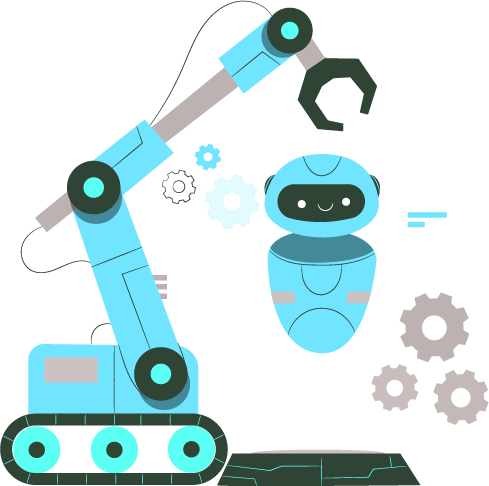Table of Content
Share This Article
- Reading Time: 7 Minutes
- Published: November 10, 2023
- Last Updated: March 1, 2025
Automation has brought about significant changes in the field of accounting. A substantial portion of accounting tasks can now be accomplished automatically, leading to notable advancements in the accounting software industry. This shift streamlines processes, minimizes errors, and conserves valuable time and resources. Automation is greatly appreciated by a majority of accountants, who find it to be more efficient. It has revolutionized how businesses handle their financial operations. In this conversation, we will explore how accounting automation benefits businesses, and the roles that can be automated to simplify financial tasks for your business.
What is Accounting Automation?
Accounting automation, or computerized accounting, is all about using software to handle important financial tasks in business. It cuts down or even gets rid of the need for people to do things manually and deal with complicated spreadsheets.
Accounting software takes care of basic jobs like gathering data and putting it into the company’s financial records, sorting out any differences, updating records, and creating financial reports. The magic of Automated accounting is that it makes accounting faster, easier, and more accurate. Plus, it lets your team focus on more important tasks and big-picture strategies, saving time, effort, and money. It’s like having a digital assistant that streamlines your financial work for maximum efficiency.
Effects of Automation on Accounting & Bookkeeping
Automation is reshaping the accounting and bookkeeping process, making these traditionally labor-intensive tasks more efficient and less prone to human errors. Here’s a closer look at how accounting automation benefits is changing the game:
-
Streamlined Data Entry and Bookkeeping:
In the past, accountants had to manually input vast amounts of financial data into spreadsheets, a tedious and error-prone process. Automation tools have revolutionized this by automating data entry and bookkeeping, significantly reducing errors and saving time. These tools can extract information from receipts, invoices, and other documents, making the process faster and more accurate.
-
Effortless Financial Reporting:
Automation simplifies financial reporting. With just a few clicks, accountants can generate financial statements, balance sheets, and income statements. This eliminates the need for manual compilation (needs manual monitoring), saving time and reducing the risk of errors. Automation for accounting also ensures that financial reports are always up to date.
-
Efficient Audit and Compliance:
Auditing and compliance processes have become more efficient with automation. Advanced software can analyze large volumes of data, detecting anomalies and flagging potential issues for further investigation. This not only improves audit accuracy but also helps accountants identify patterns and trends that might have gone unnoticed. Automation also enforces compliance with regulatory requirements by implementing checks and balances throughout the accounting system.
-
Enhanced Financial Analysis:
Automation tools have transformed financial analysis. Accountants can now conduct complex analyses and generate insightful reports with access to vast datasets and powerful algorithms. This empowers businesses to make data-driven decisions, spot areas for improvement, and develop growth strategies. Automation enables accountants to focus on interpreting financial information rather than spending hours manually crunching numbers.
-
Improved Fraud Detection:
Fraud remains a challenge in the accounting world, but accounting automation benefits have strengthened the fight against fraudulent activities. Machine learning algorithms can analyze transactions, identify suspicious patterns, and raise red flags when anomalies are detected. By automating fraud detection, accountants can minimize financial losses and protect their clients’ interests.
-
Embracing Cloud Technology:
Automation in accounting is closely tied to cloud technology. Cloud-based accounting software allows accountants to access financial data from anywhere, promoting collaboration and remote work. It also offers enhanced security measures, data backups, and seamless integration with other business applications. The cloud provides a scalable and flexible infrastructure for automation, enabling accountants to adapt to evolving business needs.
In summary, automation is revolutionizing accounting and bookkeeping by simplifying tasks, improving accuracy, and providing valuable insights. It allows accountants to focus on higher-value activities, ultimately benefiting businesses and clients alike.
Can AI Automation Replace Human Intelligence in Finance?
The integration of AI into finance software is gaining momentum, with a rapidly growing market poised to foster substantial bookkeeping automation businesses in the coming years. The surging demand for AI and machine learning is spurring advancements that will enhance the complexity of transactions and the proportion of accounting tasks these technologies can handle.
Yet, while AI plays a major role in automating various aspects of financial management, it cannot entirely supplant the human intelligence and judgment that skilled bookkeepers and accountants bring to the table. Financial management remains a collaborative effort between machines and humans. The vigilance of finance experts is indispensable for overseeing the accuracy of bookkeeping entries made by automated systems. Furthermore, AI lacks the intrinsic capacity for making strategic recommendations and nuanced business decisions, an essential domain where finance professionals excel.
Tasks That You Need to Automate in Your Business
There are many accounting automation benefits, but you might be thinking about tasks that can be automated. Listed below are the tasks that need automation to save your time cost and ease the process of accounting for your business:
-
Invoicing
Automatic billing based on customer purchase history or contract terms becomes convenient through Automated accounting.
-
Accounts Receivable
Automated software can monitor payments and overdue accounts, sending reminders as needed.
-
Accounts Payable
The software can offer accounts payable services and streamline bill payments, encompassing payment issuance and expenditure tracking.
-
Payroll
Many payroll tasks involving repetitive calculations can be automated to facilitate net pay calculation, payment distribution, and transaction recording.
-
Expense Management
Automated accounting eliminates the need for manual expense tracking, reduces approval delays, and simplifies expense recording.
-
Reconciliation
While accuracy in reconciliation requires a human touch, partial automation can expedite the reconciliation process.
-
Budgeting and Forecasting
Automated software aids in budget creation, tracking, and generating reports on historical spending and future trends.
-
Financial Reporting
Automated software compiles financial data into user-friendly reports for management or shareholders.
Steps to automate your accounting process
If you are confused about how to start accounting automation, follow the steps below to get started with automated accounting:
-
Outline your business requirements and objectives:
Clearly define what you aim to achieve by automating your accounting processes and ensure all stakeholders know these goals.
-
Conduct thorough research:
With numerous automated accounting software options available in the market, take the time to identify the one that best suits your specific needs.
-
Create a strategy:
Once you’ve chosen the appropriate software solution, craft a detailed plan for its integration within your organization. Involve all relevant stakeholders in this planning phase.
-
Thoroughly test the system:
Before implementing the new system, conduct comprehensive testing to guarantee a seamless transition and prevent disruptions to your business operations.
-
Train your employees and offer ongoing support:
Following the system’s implementation, provide effective training on its usage. Additionally, ensure that there is ongoing support available whenever necessary.
How is Accounting Outsourcing Helpful in Automated Accounting?
Online outsourced accounting & bookkeeping services offers significant benefits, including facilitating automated accounting. It leads to cost savings by eliminating the need for in-house accountants and specialized software. It provides access to expert professionals well-versed in the latest accounting technologies, including automated accounting systems. By delegating accounting tasks to external firms, your in-house team can focus on core activities, such as product development and customer service, ultimately enhancing overall productivity. Moreover, outsourcing firms are adept at staying compliant with changing financial regulations, a crucial aspect when implementing automated accounting systems, ensuring that your financial practices adhere to the required standards. This approach streamlines your financial processes, incorporating accounting and bookkeeping automation to enhance your business’s financial efficiency and overall success.
Bottom Line
As discussed above, automation of accounting process is becoming a big thing in managing finances effectively and that might help you save time and increase your productivity so that you can focus on other business tasks. Knowing your business type and choosing the software that suits your business needs is very important. By following the proper guidance of adopting automated accounting or taking assistance from outsourced accounting and bookkeeping services, one can make the accounting process easy and achieve the goal of sustainable growth.

Get customized plan that supports your growth

Thousands of business owners trust Whiz to manage their account
Let us take care of your books and make this financial year a good one.








